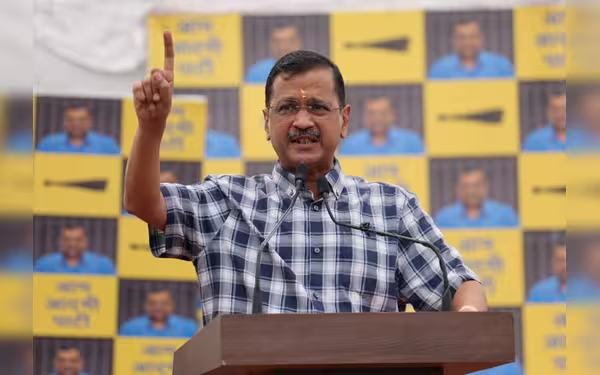Saturday, November 16, 2024 07:24 PM
Kejriwal Resigns as New Delhi Chief Minister After Bail in Bribery Case
- Kejriwal resigns two days after bail in bribery case.
- Accusations labeled as political conspiracy by Kejriwal.
- Opposition rallies support against alleged misuse of federal agencies.
 Image Credits: thefrontierpost
Image Credits: thefrontierpostArvind Kejriwal resigns as New Delhi Chief Minister just days after bail in a bribery case, raising questions about political integrity and future elections.
In a significant political development, Arvind Kejriwal, the chief minister of New Delhi and a prominent figure in India's opposition, has announced his resignation just two days after being granted bail in a bribery case. This decision comes in the wake of his arrest nearly six months ago, which many believe was politically motivated, especially as it occurred ahead of national elections.
Kejriwal, known for his strong criticism of Prime Minister Narendra Modi, was accused of receiving bribes from a liquor distributor. The allegations suggest that he and his party accepted a staggering 1 billion rupees (approximately $12 million) in exchange for altering a liquor sales policy that would benefit private companies. However, Kejriwal has vehemently denied these accusations, labeling them as a “political conspiracy” aimed at undermining his party, the Aam Aadmi Party (AAP).
During a public address at the AAP headquarters, Kejriwal posed a poignant question to the public: “Do you consider Kejriwal honest or a criminal?” This rhetorical question highlights the deep divide in public opinion regarding his leadership and the ongoing political turmoil in India. He stated, “I will resign from the post of chief minister two days from today,” indicating a swift transition in leadership.
The AAP, which has emerged as a significant challenger to Modi’s Bharatiya Janata Party (BJP), is part of a broader coalition of opposition parties known as INDIA. Following Kejriwal's announcement, the party plans to convene a meeting to determine his successor. Additionally, Kejriwal has called for the upcoming New Delhi elections, scheduled for February next year, to be moved to November, a request that underscores the urgency of the political climate.
Opposition parties have rallied around Kejriwal, condemning his arrest as a misuse of federal investigation agencies by Modi’s government to intimidate political rivals. They have pointed to a series of raids and investigations targeting key opposition figures in the lead-up to the elections, raising concerns about the fairness of the political landscape.
In a show of support, Kejriwal’s supporters celebrated his release with firecrackers and dancing outside his residence, demonstrating the loyalty he commands among his base. However, some leaders from Modi’s party have cautioned that while Kejriwal has been released on bail, he has not been acquitted of the charges against him, leaving the door open for further legal challenges.
Arvind Kejriwal, a former civil servant, founded the Aam Aadmi Party in 2012 with a promise to cleanse Indian politics of corruption and inefficiency. The party’s symbol, a broom, represents its commitment to sweeping away graft, resonating with New Delhi’s residents who are frustrated with rising inflation and sluggish economic growth.
As the political landscape in India continues to evolve, Kejriwal’s resignation raises questions about the future of the AAP and the broader opposition coalition. The upcoming elections will be a critical test for all parties involved, as they navigate the complexities of public sentiment and political strategy in a rapidly changing environment. The unfolding events serve as a reminder of the intricate dance of power, accountability, and public trust in the world’s largest democracy.













